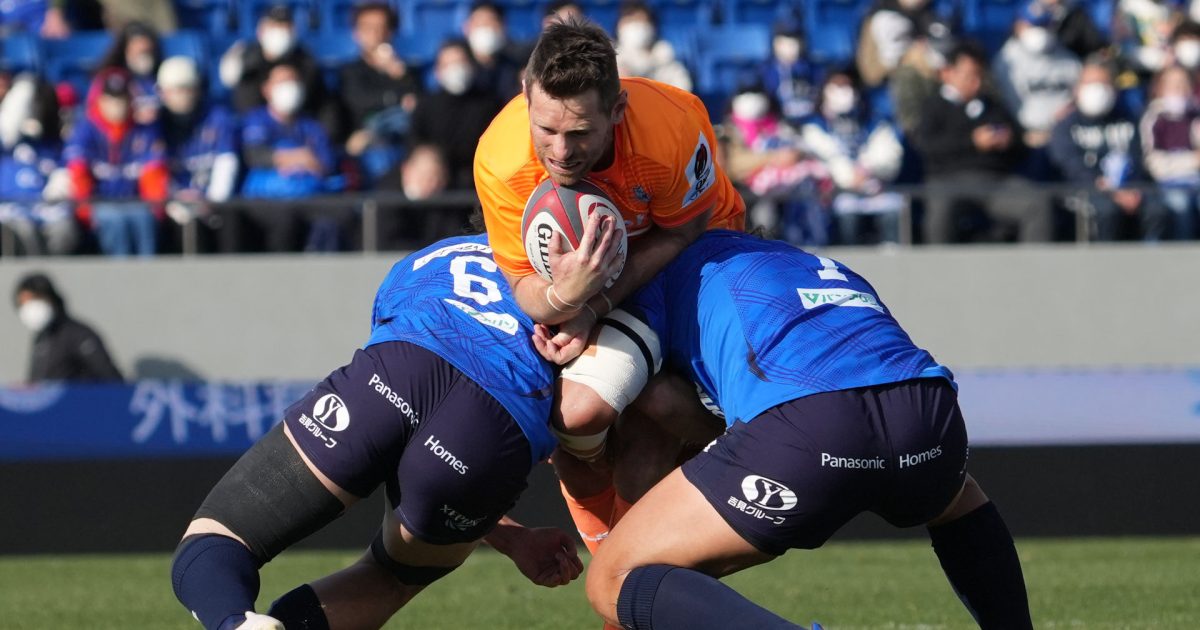Wallabies exiles run riot in Japan as England forward scores again

Bernard Foley’s Kubota Spears Funabashi Tokyo Bay have become the second team to qualify for the semi-finals of Japan Rugby League One after a big win over Will Genia’s Hanazono Kintetsu Liners.
The Spears won 55-17, scoring nine tries, four of which were scored by the exciting Japanese winger Haruto Kida, who now has 15 for the season.
Foley, who was one of three Japan-based players to be named in the Wallabies training squad last week, along with Panasonic’s Marika Koroibete and Kintetsu’s Quade Cooper, kicked four conversions, taking his season tally to a league-high 164, 32 points ahead of second-placed Matt McGahan.
McGahan’s Ricoh Black Rams Tokyo became the 14th victim of Koroibete’s Saitama Panasonic Wild Knights, as the back-to-back league champions moved to within two games of completing the regular season undefeated.
Despite a fifth try from his last six matches by ex-England backrower Nathan Hughes, the Peter Hewat-coached side fell 25-12, dropping one place on the championship standings to seventh.
Third-placed Tokyo Suntory Sungoliath continued their good form, moving to within two points of a semi-final berth after a hard fought 25-17 win over Kobelco Kobe Steelers in the Tokyo rain.
Last year’s beaten finalists, who have Wallaby coach Eddie Jones as a club advisor, came from 14-12 down at halftime to grab the win.
The loss left the 2018 champions Kobe, for whom former All Black coach Wayne Smith is involved in an advisory capacity, just one place above the relegation zone.
Those positions are occupied by Kintetsu along with NEC Green Rockets Tokatsu and Mitsubishi Heavy Industries Sagamihara Dynaboars who all lost on the weekend.
Despite fielding former Wallabies Matt Toomua and Curtis Rona, Mitsubishi was hammered 53-5 by Steve Hansen’s Toyota Verblitz, while NEC fell 45-17 to Faf de Klerks’ Yokohama Canon Eagles.
Canon are in a close race with the Todd Blackadder-coached Toshiba Br ave Lupus Tokyo for fourth, with Toshiba keeping their hopes alive after a fifth straight win, beating Shizuoka Blue Revs 37-29.
Elsewhere, Australians Tom Jeffries and Josh Fenner shared in the first title of the league season, after NTT Docomo Red Hurricanes beat Chugoku Electric Power Red Regulions 31-0 in Hiroshima to claim the Division Three title with two games to spare.
The Brisbane State High School-educated Fenner, who scored a try, was a member of a stellar 2016 Queensland GPS team of the season, alongside Jeffries, who schooled at Nudgee College.
The now Osaka-based players were joined in that team by current or former Super Rugby stars Harry Wilson, Fraser McReight, Isaac Lucas, Len Ikitau, Josh Nasser, and Trevor Hosea.
The team also included Stade Francais prop Moses Alo-Emile and NRL stars, Manly second-rower Ethan Bullemo, and North Queensland winger Murray Tualagi.









































































